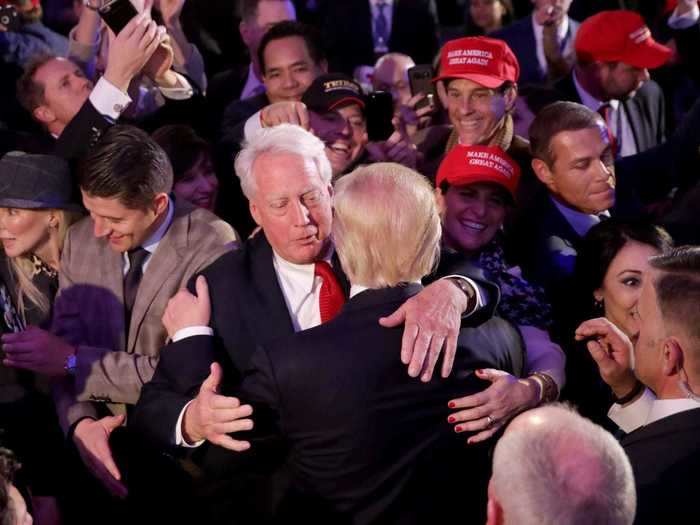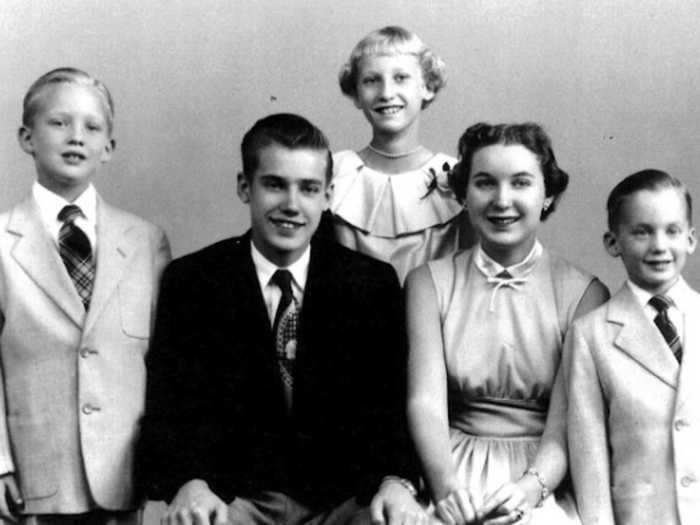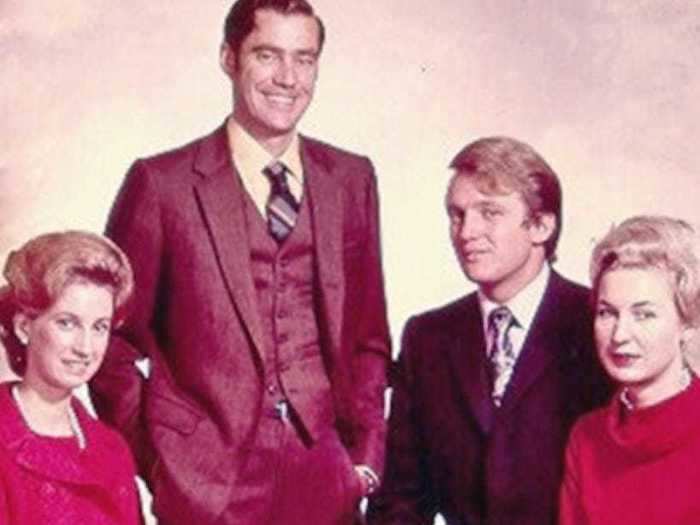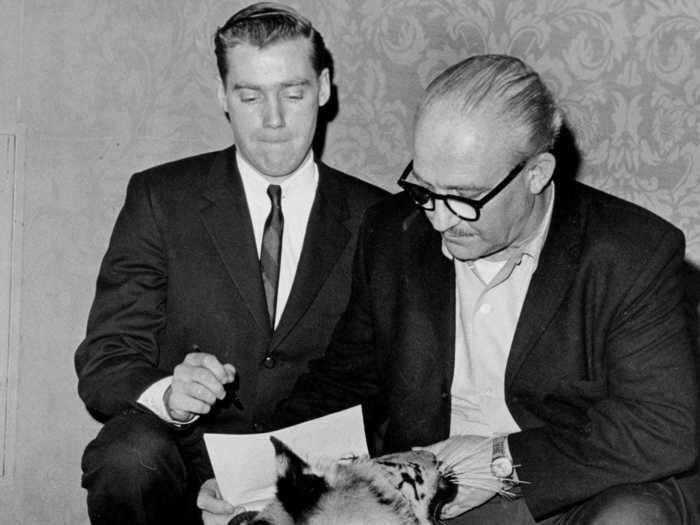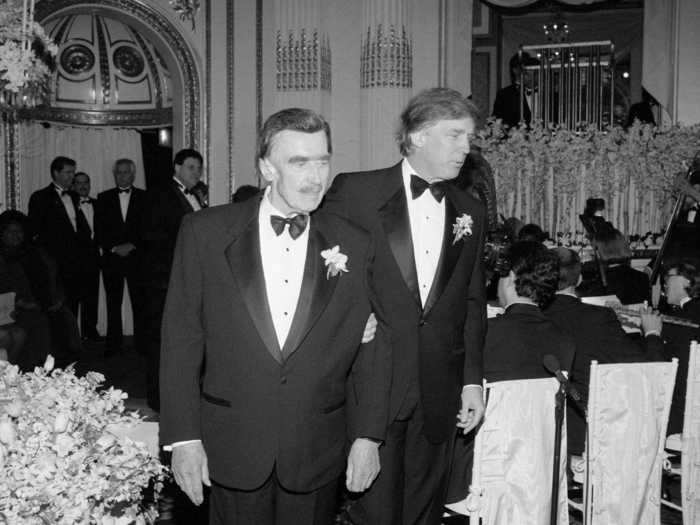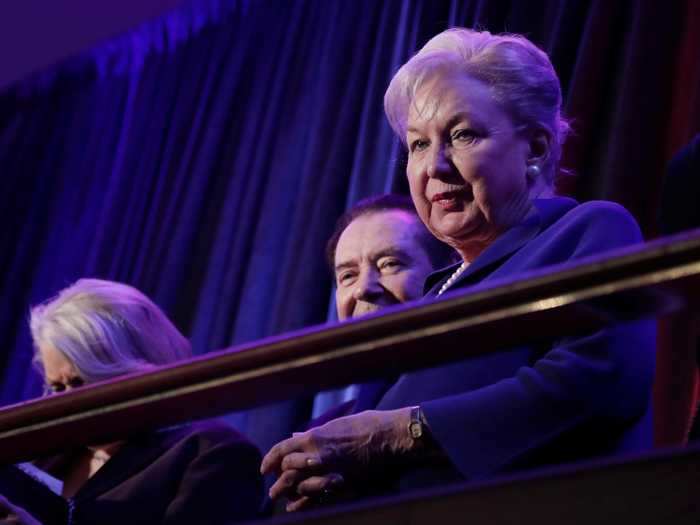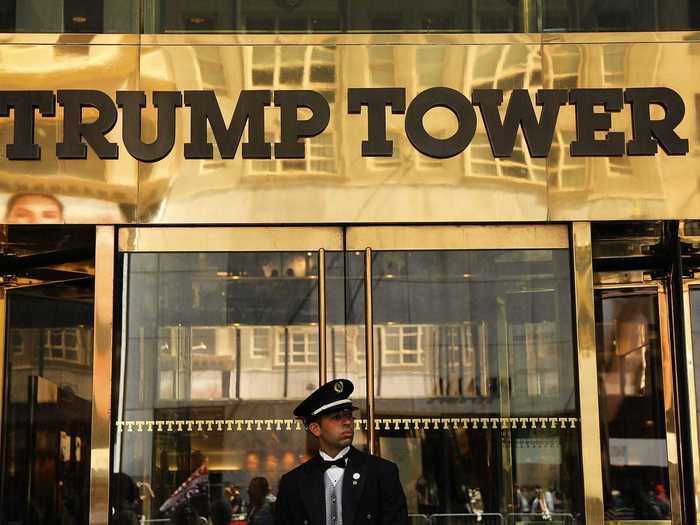As a child, Donald Trump hid his younger brother Robert's favorite toy trucks and pretended he didn't know where they were.
Donald Trump hugs his brother Robert after winning the presidency in 2016.
Chip Somodevilla/Getty Images
"The last time it happened, when Robert's tantrum spiraled out of control, Donald threatened to dismantle the trucks in front of him if he didn't stop crying," Mary Trump wrote.
Instead of punishing Donald, Mary said her grandmother put the trucks in the attic, "effectively punishing Robert, who'd done nothing wrong."
She said this was one of the earlier incidents of Donald being enabled by his parents.
"He wasn't yet being rewarded for selfishness, obstinacy, or cruelty, but he wasn't being punished for those flaws, either," Mary Trump wrote.
Donald Trump never forgave his older brother Freddy — Mary's father — for dumping a bowl of mashed potatoes on his head when he was 7.
Donald Trump (far left) and his family.
Instagram/Donald Trump
According to Mary, this is a legendary Trump family story that she says shows where the president got his taste for humiliating others.
It happened when Donald was seven, and was fighting with his brother Robert. He refused to listen to his mother's orders for him to stop.
Desperate to bring the fighting to an end, 14-year-old Freddy took matters into his own hands and dumped a bowl of mashed potatoes on Donald's head. Everyone in the room, except Donald, burst into laughter.
"It was the first time Donald had been humiliated by someone he even then believed to be beneath him. He hadn't understood that humiliation was a weapon that could be wielded by only one person in a fight," Mary Trump wrote.
"From then on, he would never allow himself to feel that feeling again. From them on, he would wield the weapon, never be at the sharp end of it."
He never forgotten the incident, Mary said.
When his older sister Maryanne brought it up at a gathering at the White House in 2017, the president "listened with his arms tightly crossed and a scowl on his face," Mary Trump wrote.
"He clearly still felt the sting of that long-ago humiliation," Mary recalls in the book.
Later in life, Trump disparaged Freddy's dream of becoming a pilot.
Donald Trump (second from right) and his siblings.
Trump Campaign
The family ridiculed Freddy for his dream, Mary said.
During a visit to Freddy's Marblehead, Massachusetts home, 18-year-old Donald tore into his brother at dinner, saying: "Dad's really sick of you wasting your life."
"Dad's right about you: you're nothing but a glorified bus driver," Donald added.
When Freddy returned to the family business soon after, Donald continued to pester him about his flying hobby, Mary said.
While discussing a real-estate deal at their parents' Queens home, Donald accused his brother of being distracted.
"Maybe you could have kept your head in the game if you didn't fly out to Montauk every weekend," Trump said, according to his niece.
Fred Sr. then ordered his son to get rid of the plane, and Freddy obliged, according to Mary.
When Freddy was on his death bed in 1981, Trump went to the movies.
Mary Trump's father Fred Jr. (left) and Murray Zaret, producer of the Pet Festival and Animal Husbandry Exposition, in March 1966.
Louis Liotta/New York Post Archives /NYP Holdings, Inc. via Getty
Freddy Trump was taken by ambulance to the Queens Hospital Center in Jamaica, New York, the afternoon of September 26, 1981, Mary Trump wrote in the book.
She said no one went with her father to the hospital, and that her grandparents could only get through to two of their four other children — Donald and Elizabeth — who came by the family home after hearing the news.
Mary Trump continued to say that by the time her mom arrived at the home that evening, her uncle and aunt had gone out to the movies.
When the two returned a few hours later and heard there had been no update on Freddy, Donald left, Mary says.
Fred Trump Jr., 42, died alone at the hospital, Mary said.
Donald Trump belittled his father as he started to succumb to Alzheimer's disease in the 1990s.
Fred Trump Sr. and Donald Trump at his wedding to Marla Maples in 1993. The elder Trump was diagnosed with Alzheimer's that same year.
Time & Life Pictures/Getty
In her book, Mary Trump claimed witnessing her uncles Donald and Robert ignoring their father during a family gathering after Fred Trump Sr. started to succumb to Alzheimer's in the 1990s.
According to Mary, Fred came up to his sons while they were talking in the breakfast room at the family's Queens home, handed them an advertisement for a limousine, and asked them: "Can I get this?"
"Donald took the page and handed it to Rob, who folded it in half and slid it onto the table," Mary Trump wrote.
"Having served his father's purpose, Donald now treated him with contempt, as if his mental decline were somehow his own fault."
In an interview with Axios, published June 21, the president said that his niece's report that he "dismissed and derided" his father was "a disgraceful thing to say."
Trump did not take the advice of his older sister when she called to counsel him ahead of his first summit with North Korean leader Kim Jong Un in 2018.
Maryanne Trump Barry pictured during her brother's election night rally in New York City on November 9, 2016.
Julie Jacobson/AP
According to the book, Mary's aunt Maryanne called President Trump's secretary on the eve of his first meeting with Kim Jong Un in June 2018, leaving the following message:
"Tell him his older sister called with a little sisterly advice. Prepare. Learn from those who know what they are doing. Stay away from Dennis Rodman. And leave his Twitter at home."
Mary says her uncle took none of her aunt's advice, and that the two siblings have barely spoken since.
"He ignored all of it. The Politico headline the following day read 'Trump Says Kim Meeting Will Be About "Attitude," Not Prep Work.' If Maryanne had every had any sway over her little brother, it was gone now," Mary wrote in the book.
When Mary Trump and her brother contested their grandfather's will, they were cut off the family's health insurance plan.
A guard stands outside of Trump Tower on Fifth Avenue in Manhattan on August 24, 2018.
Spencer Platt/Getty
Mary Trump wrote in her book that she and her brother had had this health insurance since they were born, and that everyone in the family got it.
When their uncle cut them off, it was especially hard for her brother, who had just given birth to a son with serious health issues.
"My brother depended upon this insurance to pay for my nephew's crushing medical expenses," she wrote.
"Taking away our insurance didn't benefit them at all; it was merely a way to cause us more pain and make us desperate," Mary wrote about Donald, Robert and Maryanne Trump, who acted as executors of their father's estate.

